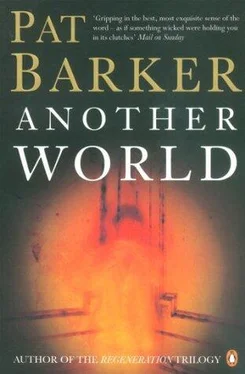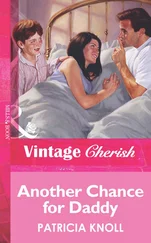‘No, it’s not. It’s just… Miranda.’
‘I thought she might help.’
‘I can’t use her as a nanny. Anyway, she’s got her own problems.’
‘He’s not going to last more than a week.’
‘All right.’ She leans across and kisses him. ‘Ring me before you go to bed?’
Geordie’s face becomes more skull-like as night approaches. It’s just the effect of increasing tiredness — Nick knows that — but it’s difficult not to imagine that he’s witnessing flesh peeling back from bones, revealing what’s been there all along, working its way to the surface from the moment of birth. Geordie nods off, then wakes with a start, staring round him as if he doesn’t recognize the room he’s in. With darkness falling, the other world closes in.
At nine thirty, immediately after the news, he says, ‘Well, that’s it, then, I’m done in.’
Nick goes upstairs with him and sees him settled into bed. ‘There’s nowt like it,’ he says. ‘Nowt like your own bed.’ He burrows down on the left-hand side of the double bed. Even after forty-odd years he still leaves space for his wife. With part of his mind he’s convinced she’s just popped across the landing for a pee.
Geordie falls asleep immediately, and again wakes, this time with a cry of fear. Nothing, it’s nothing. The room comes back. Some old bugger’s sitting up in bed blinking at him; after a fractional hesitation he identifies his reflection in the mirror. There’s sweat in the creases of his neck. It’s always so vivid, Harry’s face clearer than his own hand in front of his eyes, and yet distorted. Harry disappears, bit by bit, like the Cheshire cat, until only the screaming mouth is left. Night after night he feels himself falling towards that mouth.
Nick pops his head round the door. ‘I thought you were awake. Do you want to come back down?’
‘No, I’ll stop up here. She’s a good-hearted lass, Frieda, but she’d wear any bugger out.’
Nick goes downstairs to find Frieda wrestling with the mysteries of the video recorder. ‘Morecambe and Wise,’ she says, wheezing from the exertion. ‘Won’t do your Grandad any harm if we have a laugh.’
Upstairs Geordie, dozing with half-closed eyes, hears the laughter and thinks, Sounds like a good show. He’s floating on the edge of darkness, a pale square just in front of his eyes that looks like a window but can’t be because there aren’t any windows here. After a while he feels the chicken wire creak as somebody sits down beside him, and lies, tense and still, seeing only a dark shape. ‘Harry?’
‘It’s me, Grandad.’
Bloody cheek, calling him Grandad, whoever it is. A light’s switched on. Geordie blinks at the roses on the wall, at the strange face bending over him, a face that gradually becomes familiar. ‘Nick.’
Nick, seeing he’s dazzled by the lamp, reaches for the switch.
‘No, leave it on a bit.’
It helps, Nick sees, to locate himself in a brightly lit room. Darkness, by disorienting him in space, loosens his grip on time as well.
‘Has she gone home?’
‘Who?’ Nick asks, testing for confusion.
‘The cat’s grandmother.’
‘Yes. Is there anything I can get you?’
‘No, I’ve got me water. I’ll be right.’
But he shows no sign of settling down. They’re in for a bad night, Nick thinks. Night’s being turned into day, the upside-down time of the trenches, funk holes by day, working parties and patrols at night. Geordie’s living to the tick of a different clock.
Nick puts his feet up on the sofa, not ready for bed yet. He’s brought the transcripts of Helen and Geordie’s tape-recorded conversations with him, and dips into them at random as he finishes his drink.
To begin with Grandad didn’t understand what Helen was after. He was used to people asking questions about the First World War, but Helen’s mainly interested in afterwards, not in the content of his memories but in how he coped with them later on. There’s comparatively little about the war itself, and perhaps this is why there’s no account of Harry’s death. It’s not the only reason, though. Geordie sounds uncomfortable whenever Harry’s mentioned.
HELEN: What was Harry like?GEORDIE: Oh, he was a grand lad. Into everything, you know, played football, sang in the choir, amateur dramatics, all that sort of thing, anything really, if there was owt going on he was in the thick of it. All the lasses chased after him, and me mam, well, she absolutely idolized him.HELEN: And you hero-worshipped him?GEORDIE: Did I hell. (Laughs.) I was jealous to death of him. I remember when we were lads we used to swim in the river and there was a bridge you could jump off and the water was quite deep. Harry would have it I was too little, so I had to guard the clothes, and I remember watching our Harry jump in, waiting for the bubbles coming up, you know, and I used to think, Go on, you bastard, drown. And then when he come up I used to think, Thank God. (Laughs.)HELEN: You joined up at the same time as Harry?GEORDIE: Yes.HELEN: And you were in the same regiment?GEORDIE: Yes.HELEN: He was killed in 1916. Did you ever wonder why it was him and not you?GEORDIE: You always wondered that. One time there was six of us by the side of the road and I’d ate something that didn’t agree with me. I just had to do a runner fast as I could. I was squatting down with me trousers round me ankles when a shell come over and they’d gone. You see you can’t make sense of that, can you? I got the squitters, so I’m alive. Where’s the sense in that?HELEN: What were their names?GEORDIE: Harry Parks. Joe Hardcastle. Douglas Horn. Billy Watson. Walter Baines.HELEN: When did it happen?GEORDIE: August 31st 1915.
That’s typical of the clarity of his memories. He remembers everything, talks about everything — except Harry. Helen gets back to the main thread of the interviews, or what she intends to be the main thread.
HELEN: What sort of state were you in when you got back?GEORDIE: When I came back?
For Nick this is one of the chilling moments in the transcripts. There’s something curiously blank about that repetition of her question, almost as if he’s wondering whether he did come back.
The silence worries him. He hurries to fill it.
GEORDIE: Pretty bad, I suppose. Nine pence to the shilling, I suppose you’d say, but I wasn’t the only one, there was a lot like that.HELEN: You got over the bayonet wound all right?GEORDIE: Never bothered me. Aches a bit when there’s rain coming. It’s a better weather forecaster than them buggers on the telly, I tell you that.HELEN: So it was your nerves that were bad?GEORDIE: Yes, nightmares, I used to wake up shouting. And I had an awful stammer. I suppose the truth is I was shell-shocked, but they didn’t seem to talk about that in them days. You just had to shut up and get on with it. You know, you were alive, you had the same number of arms and legs you set off with so what the bloody hell were you moaning on about? That was the attitude, and for all you were supposed to be heroes and all that you didn’t have to say much before they accused you of malingering. You just had to snap back. Knicker elastic, that’s what we were.HELEN: And you couldn’t?GEORDIE: No, well, I couldn’t. I think with me only being eighteen, well seventeen, when I joined up I’d never really got established, you know. I think mebbe some of the older lads with jobs and kiddies, and all that, there was like… You know, they had something to build on.HELEN: You were twenty-one when you came back?GEORDIE: Yes.HELEN: An old twenty-one?GEORDIE: In some ways. No experience of anything that mattered. Job? I knew how to kill people. Not a lot of demand for that. And it’s not much use when it comes to chatting up the lasses either.HELEN: I can’t believe you ever had any problems with that, Geordie.GEORDIE: Didn’t know where to start, love. I do now, but it’s not a lot of use to me now , is it?
Читать дальше












